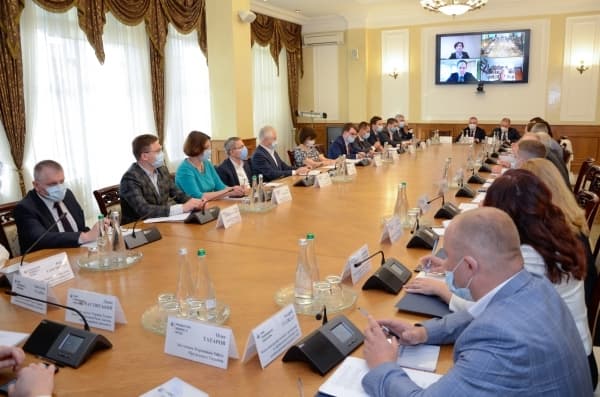G7 urges Ukraine not to sabotage selection of anti-corruption prosecutor

The Group of Seven (G7) most industrialized nations on Dec. 2 urged Ukraine not to delay the selection of the chief anti-corruption prosecutor.
The joint statement followed months of unexplained delays in convening the panel that will choose the prosecutor. Anti-corruption watchdogs have blamed disruptions from the President’s Office for the delays.
“G7 Ambassadors urge the commission selecting a new special anti-corruption prosecutor to conclude its important function and, without further delay, finalize the process of selecting a new head of the special anti-corruption prosecutor's office, in full transparency,” the G7 ambassadors said on Twitter.
“Independent anti-corruption institutions, including an independent specialized anti-corruption prosecutor, remain crucial to Ukraine’s resilience and prosperity, and to reducing the harmful impact of oligarchs on Ukraine’s economy and politics.”
The President's Office and the selection panel did not respond to requests for comment.
The chief anti-corruption prosecutor oversees all cases pursued by the National Anti-Corruption Bureau (NABU). The selection of an independent professional who is free from political influence has been a key requirement of Ukraine's Western partners and donors.
The panel that chooses the prosecutor consists of four international experts and seven people chosen by parliament. The latest meeting of the panel was scheduled for Dec. 2 but failed to take place.
The selection panel officially stated that the meeting failed due to the lack of a quorum. However, one of the international members, Roman Kuybida, challenged this assertion.
"Almost all panel members were present, and there must have been a quorum," Kuybida said on Facebook. "The cancelation of the meeting was unexpected for all members present, and the real reasons (for the cancelation) are still unclear."
Vitaly Shabunin, head of the Anti-Corruption Action Center's executive board, wrote on Facebook that "the selection panel members controlled by the President’s Office disrupted a meeting of the panel again."
He argued on Dec. 2 that the President's Office would try to rig the selection through the members it controls.
Earlier on Nov. 26 Zelensky said he was not aware of any pressure on the panel by the President's Office. He added that he hoped the anti-corruption prosecutor would be chosen by the end of 2021.
After President Volodymyr Zelensky and U. S. President Joe Biden met on Sept. 1, the two leaders jointly stated that a new anti-corruption prosecutor must be chosen with the best international practices.
History of sabotage
The office of the chief anti-corruption prosecutor has been vacant since August 2020, when the previous holder of the job, Nazar Kholodnytsky, resigned.
In June, foreign experts on the selection panel vetoed Andriy Kostin, a member of parliament from Zelensky’s ruling Servant of the People party. Kostin was seen as the government’s preferred candidate for the job.
Since then, meetings of the selection panel have been disrupted many times because pro-government panel members failed to attend, according to Shabunin. The Anti-Corruption Action Center believes the President’s Office is disrupting panel meetings because it does not want an independent prosecutor to be chosen.
In a comment to the Kyiv Independent, Kateryna Koval, head of the selection panel, previously blamed foreign experts for disrupting panel meetings.
The foreign panel members denied Koval's allegations, asking her to issue an apology.
Drago Kos, one of the foreign experts on the panel, has also said that the panel endured political pressure.
Zelensky's deputy chief of staff Oleh Tatarov, a bribery suspect, handpicked pro-government members of the commission, according to a May 13 report by Radio Free Europe/Radio Liberty’s investigative program Schemes. Commission members either know Tatarov personally or are connected to him, Schemes reported. Tatarov did not respond to requests for comment.
If the winning candidate does not suit the authorities, they may also stop the selection process through a court decision or delay it indefinitely, the Anti-Corruption Action Center argues.
Remaining candidates
Anti-corruption activists have accused pro-government panel members of vetoing the best, most independent candidates.
Only two candidates are left: Oleksandr Klymenko, a detective of the National Anti-Corruption Bureau of Ukraine (NABU), and prosecutor Andriy Synyuk.
Klymenko’s candidate score is 212, and the Anti-Corruption Action Center has praised him for investigating top officials, including Tatarov. Synyuk, who has 195 points, is a direct subordinate of Prosecutor General Iryna Venediktova, which raises concerns about his independence.
On Oct. 28, Synyuk and Klymenko submitted a written assignment and must now pass the final interview.
Kuybida on Dec. 2 published scores given by international panel members for written assignments. On average, Klymenko received 18.9 points, while Synyuk got 10.6.
Kuybida said that the Dec. 2 panel meeting could have been disrupted to prevent the publication of these results.









